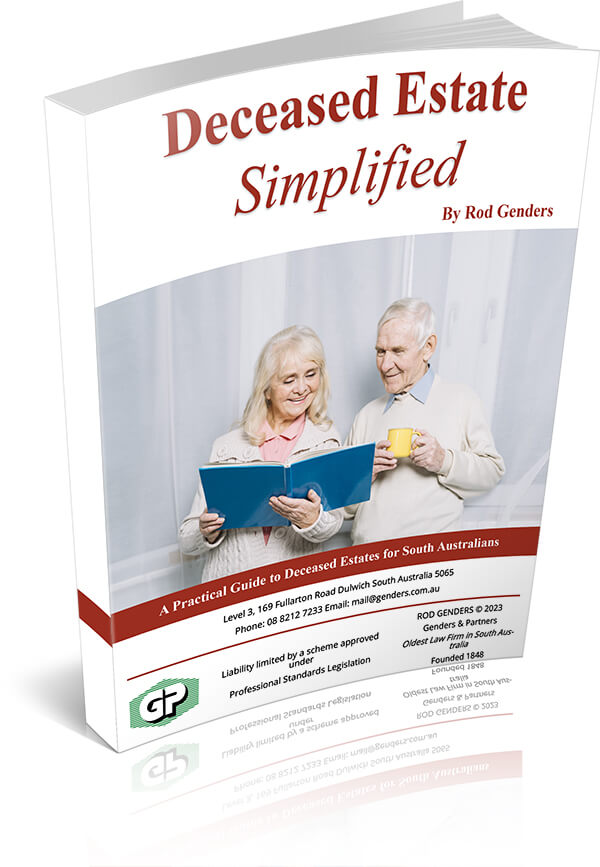Some brave (or foolhardy) souls attempt a do-it-yourself approach by trying to administer the deceased estate of a loved one themselves. This rarely ends well. You’ll save a lot of time and energy if you seek the counsel of a lawyer with extensive knowledge of probate & deceased estates in Adelaide.
There are several types of grants that you can obtain from the Probate Registry, and your specialist lawyer at Genders & Partners will determine exactly what you need to do and will guide you through every step of the process.
Informal Administration
In some circumstances, the deceased estate of a person may be able to be administered informally, meaning that probate is not required. However this does not mean that it is easy, and great care must still be taken. This situation most commonly arises with very modest estates which do not contain any individual asset worth more than about $10,000. This can happen for example where a married couple owns everything jointly. The first of them to die might not have any probateable estate at all, as everything passes by right of survivorship to the other. In these circumstances probate might not be required for the first of their estates, but it probably will be required for the second.
Even if probate is not required, other formalities are still likely to be required, including an Application to Register Death for any real estate. Re-titling of other assets needs to be done carefully to prevent problems down the track. Effects upon pensions and other Government benefits will need to be taken into account.
Grant of Probate in Common Form
In order for a grant of probate to be made, a Will must exist and an executor must be appointed. Probate consists of registering the Will with the Supreme Court to prove its validity and authorise the executor to handle the distribution of the assets. Several carefully prepared documents, including an affidavit of assets and liabilities, must accompany the probate application. The original Will (and soon the original death certificate) must also be lodged at the same time.
Grant of Probate in Solemn Form
Compared the summary process of proof in common form, where the application is typically dealt with by the Probate Registry of the Supreme Court, proof in solemn form is more complex in procedures and forms and requires opening a litigation file in the Court. It usually delays the administration of an estate and costs more in legal fees and expenses, due to its great complexity.
If there is any doubt as to the validity of a Will or any apprehension that there may be opposition, it is open to the executor or any person with a beneficial interest under the Will to prove it in solemn form. On application for proof of a Will in solemn form, notice of the Court proceedings must be served on all persons having an interest in upholding or contesting the validity of the will, together with a warning to those persons that they will be bound by the result of the proceeding.
Letters of Administration
Under the laws of intestacy, you must apply for this type of grant if the deceased left no Will. In such cases, the estate is to be distributed according to the provisions of South Australia’s Administration and Probate Act, which also determines who is entitled to administer the estate under its statutory order. That person (or more than one person in some cases) must apply for a grant of letters of administration to distribute the estate.
Letters of administration with the Will annexed
If a valid Will exists but an executor has not been appointed for example if the named executor has died), you must make an application for a grant of letters of administration with the Will annexed. This grant protects all beneficiaries and can appoint you as administrator of the Will if the courts find you entitled to assume that role.
Expert Advice on Probate & Deceased Estates in Adelaide South Australia
Whatever your needs for probate, deceased estates, Wills & estate planning in Adelaide, Genders & Partners has the experience and legal expertise to handle the matter effectively. We offer new clients a free, no-obligation telephone consultation, so call us today for more information.
Enjoy this article? Check out the full report containing “A Guide for Beneficiaries of a Deceased Estate in South Australia” from senior Australian lawyer Rod Genders.
FREE REPORT “Deceased Estates Simplified”

In this report you will learn:
- A simple, easy to understand explanation of the estate settlement process so you anticipate what’s to come and can plan your next steps.
- Detailed information on your duties and responsibilities as an Executor, Administrator or Personal Legal Representative of an estate.
- How to handle delicate situations with beneficiaries and dependents and what you can do to resolve conflict.
- What you need to do if the deceased did not have a will
- How to deal with personal effects, property, and taxes.







